Environmental Compliance
We fulfill our environmental compliance thoroughly, for instance, by setting original criterion stricter than legal ones, in the purpose of mitigating the environmental risks such as contamination, destruction of ecosystem and climate change to the minimum.
Response to Environmental Risks
We, cooperating with Fujitsu Limited, make thorough efforts to comply with the environmental laws and ordinances related to climate change, waste or the like, which are applicable to each site, as well as regulations related to products, which are represented by "RoHS" (*1), in order to mitigate the environmental risks to the minimum.
Specifically, we not only monitor the status of the environmental legal requirements in and outside Japan, but establish and operate the system to evaluate compliance with them. In addition, we, through internal audits, environmental patrol and so on, establish the system to see if our operations meet legal requirements, and to take prompt corrective actions in time of any important defects occurring. Moreover, we take into account, the aspects of "human resource" including the retention of personnel with legal qualification and the implementation of emergency drills.
*1: Directive on the Restriction of the Use of Certain Hazardous Substances in Electrical Equipment
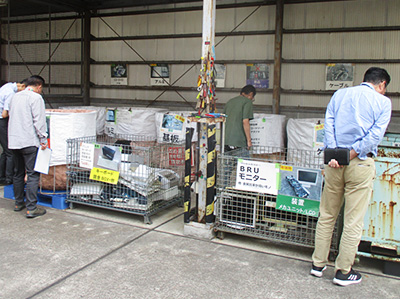 Environmental patrol
Environmental patrol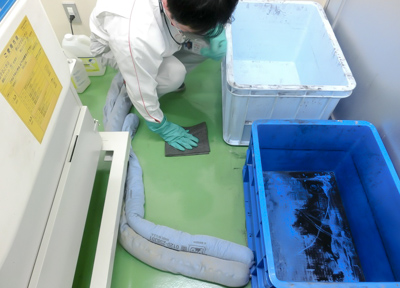 Drill in case of spillage from a 3D printer
Drill in case of spillage from a 3D printerResponse to the environmental regulations related to products
Under the circumstance that many people have more and more interests in the issues such as the safety of products and the impacts on the environment affected by products, many environmental regulations related to products are being enacted and reinforced throughout the world. Due to the fact we deliver our products to the global markets broadly under the above trend, we establish the system to manage regulated chemical substances in products per each internal process from the development until the shipping, and to meet rules of chemically hazardous products like RoHS (*1) and REACH (*2), so that we can provide our customers with compatible products.
*2: Regulation concerning Registration, Evaluation, Authorization and Restriction of Chemicals
Measures against climate change
In the aspects of our business, because we are designated as a "specified business" (which consumes energy equivalent to crude oil of no less than 1,500kl) defined by "Act on the Rationalizing Use of Energy and Shifting to Non-fossil Energy" in Japan, we take actions on the voluntary target required by this act which defines "To let energy consumption per unit be improved to 1% or more on average annually", and report to the government regularly.
We have been awarded "S Class (an excellent enterprise)" for 9 consecutive years in "Classification and Evaluation Scheme of Enterprise" since FY2016, when this scheme had been launched based on the act.
Incidentally, accompanied by the revision of the Act in April 2023, we have set "a target related to a ratio of non-fossil energy in electricity consumptions toward FY2030" and take actions.
In addition, we, following "Act on Rational Use and Proper Management of Fluorocarbons" enforced from April 2015 in Japan, have established and operate in-house structure like a special management department, so that we can manage class I specified products (mainly industrial air conditioners and refrigerators) properly, including the calculation of the total amount of leaked fluorocarbons. And, we fulfill legal requirements like a simple inspection at each division owning "class I specified products" thoroughly, to curb GHG emissions caused by leaked fluorocarbons.
Outside Japan, FDTP, one of our Group companies, has finished building up energy management structure within the plants by establishing EnMS (energy management system), appointing energy managers and so on, in order to reduce GHG emissions, following legal requirements of Republic Act No. 11285 named "An Act Institutionalizing Energy Efficiency And Conservation, Enhancing The Efficient Use Of Energy, And Granting Incentives To Energy Efficiency And Conservation Projects" put into force in November 2019 in Philippines.
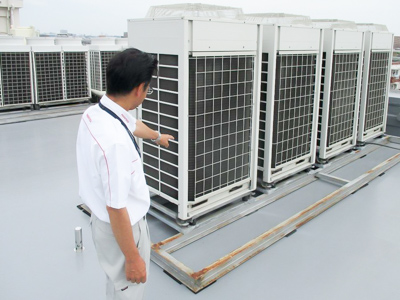 Simple inspection of compressor units
Simple inspection of compressor units
Waste management
Based on the responsibility of "a waste generator" stipulated by "Act on Waste Management and Public Cleaning" in Japan, we, following "consignment standards" etc. required by the Act, strive to reduce industrial waste as well as manage the waste properly. For example, we, our Group in Japan, make efforts to certainly monitor the process from the collection of industrial waste until the final disposal by utilizing "electronic data processing system for electronic industrial waste control sheet", and to sort waste more finely than types of waste that the Act defines, as a waste generator.
In addition, we periodically conduct on-site audits against industrial waste vendors so as to see if the waste we consigned venders is processed properly, by utilizing a representative audit framework in Fujitsu Group (if multiple sites in the Group have contracts with the same waste vendor, then a representative site conducts on-site audits as a representative).
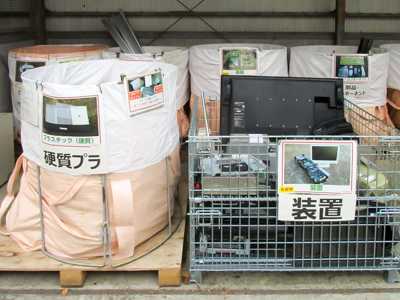 Sorting of waste and valuables
Sorting of waste and valuables
Chemical substances management
We manage chemical substances in terms of the volume of usage and storage, which we use within our sites, mainly to mitigate the impacts on the environment and human being to the minimum. In particular, we acquire SDSs (safety data sheets) on chemical substances used within our sites, and perform the risk assessments, to prevent from having negative impacts on staff using chemical substances.
In addition, following "new chemical substances regulation based on Industrial Safety and Health Act" which was enforced in stages from April 2023 and April 2024 in Japan, we have reinforced in-house chemical substances management, in instance, by designating Chemical Management Officer and Personal Protective Equipment (PPE) Wearing Management Officer at each site where chemical substances are used.
Environmental measurement
To monitor if our business activities at each site have the environmental impacts on neighborhood, we perform environmental measurement including water quality, noise and vibration, on a regular basis, by setting original criterion stricter than legal ones (As for a part of items, we also perform voluntary measurement to monitor the trends, continuously.).
In addition, we hold "Review meeting", after finishing the environmental measurement, to review the results of it, and to make decisions like the corrective actions as needed.
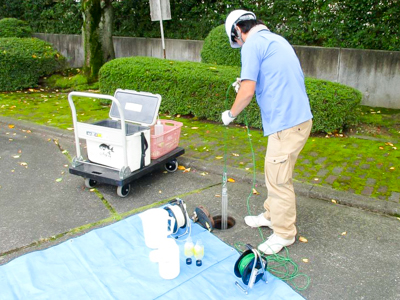 Measurement of grand water
Measurement of grand water

